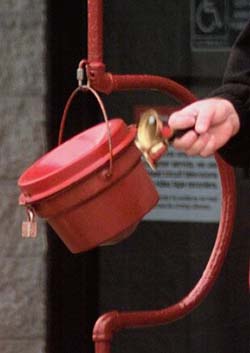
“Do you believe in God?” she asked.
“Yes”, I said
“Do you believe God cares?”
“Yes, I do.”
“Can I talk to you?...Do you mind if I sit down?...Will you sit down with me? I don’t feel comfortable with you standing.”
“Well, really I think I need to stand so I can keep an eye on this kettle and greet the people going by.” What I didn’t say
to Sylvia (which is what she called herself) was that I was also a bit wary, sensing a scam coming on. If I could stay standing, I had a chance to retain some independence, some control. They say posture helps establish a power in a relationship. (Sylvia knew that, I think, without reading any psychology textbooks. And she also knew that just because you’re standing it doesn’t mean you’ve actually got the upper hand. It’s more subtle than that.)
The story was classic. Sylvia was in the city, pretty much broke and needed bus fare to get back to Dauphin. She needed twenty dollars.
Had she phoned friends?, I asked. “I’m from out of town. I don’t have friends here.” How about social services or The Salvation Army? “I’ve been trying that all day.” Well, I think I know a number I could call. “They don’t do that kind of thing any more.”
“Maybe I’ve got five I could spare. Let me see.”
“Five won’t do me any good. I need twenty.”
I could see the yarn unfolding…very skillfully...very coherently…all the suspicions answered before they were even asked. It’s like I was listening to Sylvia’s every word, and at the same time hovering in spirit over the whole scene watching myself being reeled in.
Looking back, I realize it helped her that she was twenty-something and pretty and I was middle-aged and male. It could be true, after all, I told myself. And how would I want my daughter to be treated if she were in a pinch?
Sylvia even covered off the fact that she was aboriginal and I was white. “A cabbie took my bank card last night. Didn’t trust that I’d pay. So he took it and wouldn’t give it back.”
“Did you call the cops?”
“Yeah… and I don’t mean to say they’re racist or anything, but they took his side.” (Implication—turn me down and I’ll charge you with prejudice.)
You know where this is going. In the end, Sylvia got her twenty dollars. And I stood there feeling dumb and chivalrous and trapped, all at the same time. What, I asked myself, could I have done differently? As soon as I told my kids the story they had great answers, but at the time, I think I was overwhelmed by the unexpectedness of it—and the vivid consciousness that I was standing at a Christmas kettle in full Salvation Army uniform, in a busy mall, asking passersby to be generous. How could I be a hard nose? How could I tell her that God cared and then let the security camera record me sending her away empty-handed?
I keep telling myself I’d rather be gulled by a stranger with a plausible tale than to actually be that stranger having always to live a lie. I try to tell myself that maybe Sylvia did experience a bit of God’s grace through me. I tell myself that Sylvia’s so skilled at her brand of panhandling that she really earned what I gave her. And it all salves my ego.
But mostly I just feel dumb. And hope that next time I’ll be ready…that I’ll be as wise as a serpent and not only as innocent as a dove. Because otherwise, I’m afraid the Sylvias I meet are eventually going to make me the suspicious, cynical, tight-fisted geezer I don’t want to become.